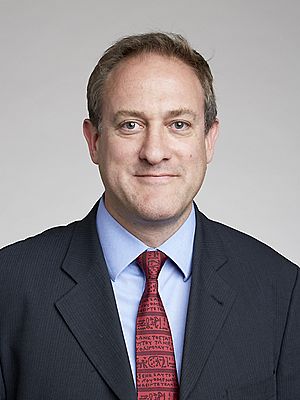Neil Burgess (neuroscientist) facts for kids
Quick facts for kids
Neil Burgess
FRS FMedSci
|
|
|---|---|

Burgess in 2017
|
|
| Born | 13 July 1966 Oakington, Cambridgeshire, England
|
| Education |
|
| Alma mater | |
| Spouse(s) |
Cathryn McDowell
(m. 1997) |
| Children | 3 |
| Awards | Royal Society University Research Fellowship |
| Scientific career | |
| Fields | Neuroscience |
| Institutions | University College London |
| Thesis | Neural networks, human memory and optimisation (1990) |
| Doctoral advisor | Michael Moore |
Neil Burgess, born on July 13, 1966, is a British scientist who studies the brain. He is a professor of cognitive neuroscience at University College London. Since 2011, he has also been a special researcher with the Wellcome Trust. Professor Burgess is known for helping us understand how our memory works and how we know where we are in space. He does this by creating computational models, which are like computer programs that show how our brain cells (called neurons) work together.
Contents
Early Life and School Days
Neil Burgess was born in Oakington, Cambridgeshire, England. His parents are Alan and Lore Burgess. He went to three different schools in Cambridge: Newnham Croft Primary School, Parkside Community College, and Hills Road Sixth Form College.
University Studies and Research
After high school, Neil Burgess went to University College London. He studied mathematics and physics there and graduated with top honors in 1987. Then, he continued his studies at the University of Manchester. He focused on theoretical physics and started working on ideas about how memory works. In 1990, he earned his PhD degree.
Exploring the Brain and Memory
Professor Burgess has created special models to explain how our brain cells, or neurons, help us remember and imagine where we are. These models help us understand how different types of memory work. This includes spatial memory (knowing where things are), episodic memory (remembering specific events), and autobiographical memory (remembering things about your own life).
His research helps us see how these memories depend on what happens in the human brain. Working with other scientists, he even predicted and found special brain cells that help us understand the boundaries of our environment.
Awards and Special Honors
Professor Burgess has received several important awards for his work. In 2009, he became a Fellow of the Academy of Medical Sciences. In 2017, he was chosen as a Fellow of the Royal Society, which is a very high honor for scientists. Before that, he held a special research fellowship from the Royal Society from 1993 to 2001.
Family Life
Neil Burgess married Cathryn Jane McDowell in 1997. They have three children: two sons and one daughter.
References
 | Dorothy Vaughan |
 | Charles Henry Turner |
 | Hildrus Poindexter |
 | Henry Cecil McBay |

